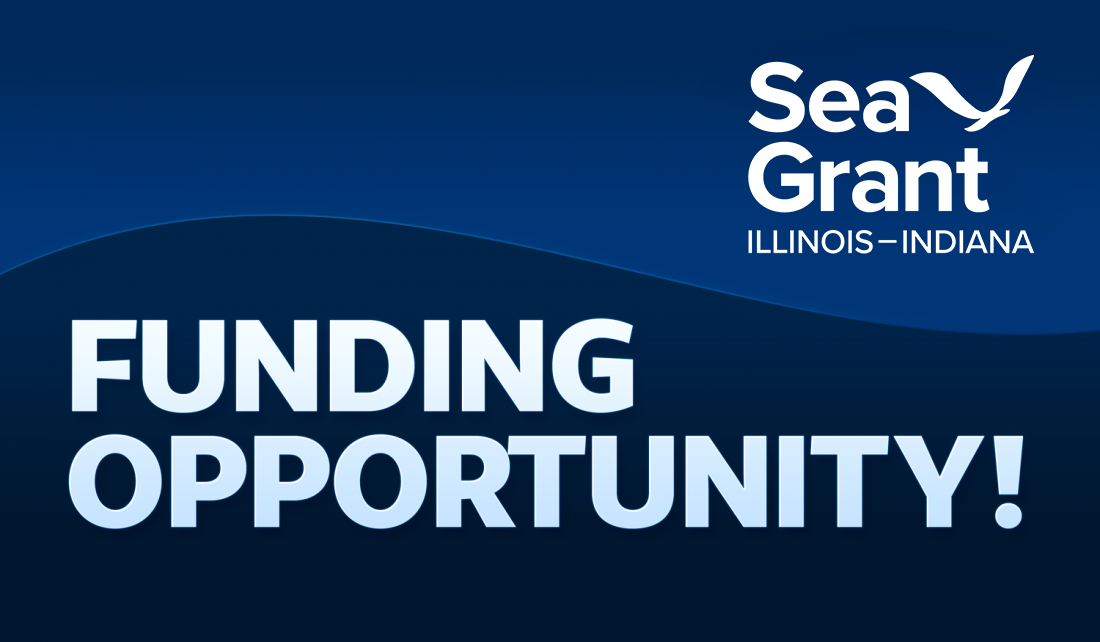
The Illinois-Indiana Sea Grant College Program (IISG) anticipates having $800,000 to invest in promising research projects relevant to southern Lake Michigan and surrounding coastal communities in northeast Illinois and northwest Indiana. Work is to be completed in the 2024-25 biennium. Work can be conducted outside of the geographic area outlined above provided applicants make a compelling case for why their work is relevant to southern Lake Michigan and surrounding coastal communities.
For the 2024–25 cycle, IISG will prioritize funding projects with outcomes that demonstrate potential to benefit underserved communities in the southern Lake Michigan region. Benefits may include but are not limited to improved quality of life, job training and student opportunities, and increased access to beneficial services or information.
IISG encourages submissions by early career scientists and/or persons who have partnered with, or plan to mentor, early career scientists. IISG also encourages all applicants to make research plans such that their work will effectively center on underrepresented racial and ethnic groups, people with disabilities, and/or people from economically or educationally disadvantaged backgrounds that have limited their ability to pursue a career in STEM.
Eligibility
Investigators from educational or research institutions including universities, museums, and NGOs, are eligible to serve as PI for these funds. Priority will be given to Illinois- and Indiana-based researchers. Researchers from other states are welcome to apply but proposed work must demonstrate how it will benefit the mission of IISG and/or meet research priorities.
Research Topics
Projects should propose to answer a clear research question or set of related questions, and should demonstrate fit with the IISG strategic plan. Five areas are of special interest for the 2024-25 funding cycle:
- Improving water safety, with a goal of reducing the number of drownings in Lake
Michigan. - Adapting to changing lake levels in the southern Lake Michigan region in support of
healthy coastal ecosystems and resilient communities and economies. - Better understanding contaminant levels in fish or shellfish that are or can be used for food. These may include Lake Michigan or tributary fish caught for subsistence fishing or Illinois- or Indiana-farm raised fish and shellfish. Contaminants to explore include but are not limited to legacy contaminants, contaminants of emerging concern, and toxic cyanobacteria from algal blooms (e.g., in nearshore regions; in ponds where fish or shellfish are raised).
- Addressing environmental justice concerns associated with restoration of degraded
southern Lake Michigan coastal sites (e.g., decommissioned power plants, industrial
parks). - Exploring economic or legal barriers to production of Illinois- and/or Indiana-grown
fish or shellfish (e.g., processing of organisms to be sold at restaurants, permitting or
acquisition of resources to expand facilities, access to skilled laborers).
Additional topic areas of interest include broader aquaculture research, aquatic invasive species, community climate readiness, fisheries, healthy waters and pollution prevention, recreation and tourism, stormwater and green infrastructure, shoreline erosion, sustainable community planning, and water supply. All research projects should fit at least one of these topic areas.
Preproposal Submission
Prospective PIs must submit a preproposal to be considered for funding. Applicants should submit materials via https://esg.iiseagrant.org/ by 11:59 p.m. Central time on February 6, 2023. Applications should be submitted to the “IL-IN SG 2023 2-Year Research Competition”. Late applications will not be accepted unless the applicant has contacted IISG staff members before the deadline to make them aware of potential issues, (e.g., computer, power, or internet issues). IISG reserves the right to refuse late applications if the program determines that individual circumstances do not warrant an extension. IISG staff members will only be available to answer questions until 5:00 pm Central time on February 6, 2023.
The full RFP can be found at https://iiseagrant.org/wp-content/uploads/2022/11/IISG-RFP-2022.pdf. Questions regarding eligibility or submission requirements may be directed to Carolyn Foley at cfoley@purdue.edu or by phone at 765-494-3601.
Illinois-Indiana Sea Grant is a partnership between NOAA, University of Illinois Extension, and Purdue University Forestry and Natural Resources, bringing science together with communities for solutions that work. Sea Grant is a network of 34 science, education and outreach programs located in every coastal and Great Lakes state, Lake Champlain, Puerto Rico and Guam.

